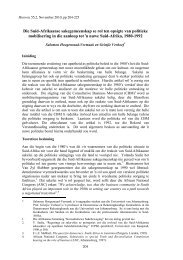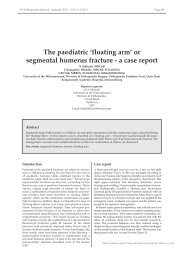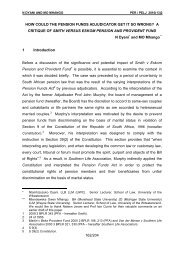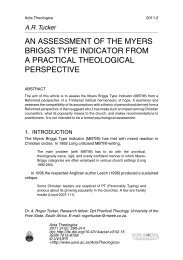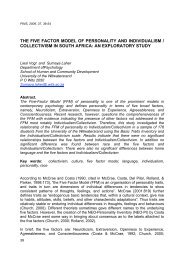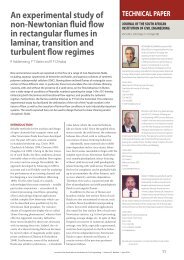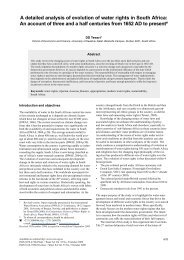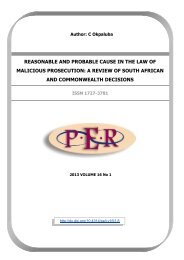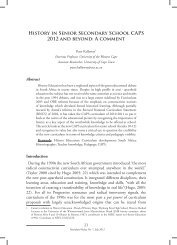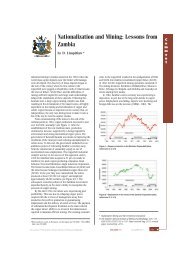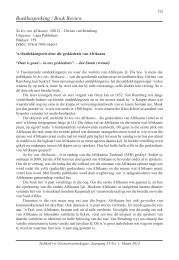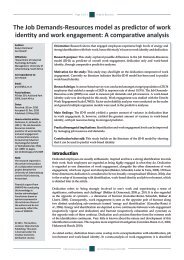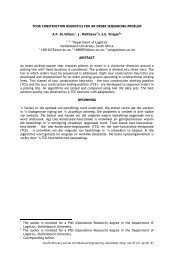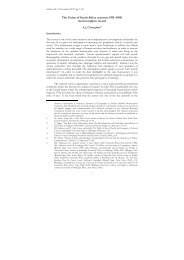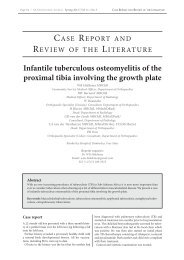Frances Baard's and Helen Joseph's struggle against apartheid ...
Frances Baard's and Helen Joseph's struggle against apartheid ...
Frances Baard's and Helen Joseph's struggle against apartheid ...
Create successful ePaper yourself
Turn your PDF publications into a flip-book with our unique Google optimized e-Paper software.
Musiiwa - <strong>Frances</strong> Baard’s <strong>and</strong> <strong>Helen</strong> Joseph’s <strong>struggle</strong><br />
They had marched, that 20 000, pressed solidly together … I could see nothing but<br />
women following us, thous<strong>and</strong>s of women marching, carrying letters of defiant protest<br />
<strong>against</strong> unjust laws, <strong>against</strong> the hated pass system, <strong>against</strong> passes for African women.” 61<br />
She perceives the category “women” as transcending racial boundaries, but she is quite<br />
aware that what brings women of all races together is not a unified experience of the pass<br />
laws but “sisterhood”. As she clarifies: “We who are not African women know how our<br />
sisters suffer. … we come as women united in our purpose to save the African women<br />
from the degradation of passes.” 62 The concept of male <strong>and</strong> female political unity<br />
overshadows Joseph’s narrative. “I looked at those many faces until they became only<br />
one face, the face of the suffering black people of South Africa.” 63 She does not refer to<br />
women only but she conflates women of all races into a symbol of a unified anti<strong>apartheid</strong><br />
force of all Africans, regardless of gender.<br />
Both Joseph <strong>and</strong> Baard perceive the anti-pass <strong>struggle</strong> as both a male <strong>and</strong> female<br />
cause. Joseph notes, “this is what the pass laws have brought to African men –<br />
punishment <strong>and</strong> misery, not for a crime, but for the lack of a pass”. 64 Baard presents a<br />
similar interpretation of <strong>apartheid</strong> but goes beyond Joseph in emphasising women’s<br />
initiative. She notes:<br />
Also the men knew what the passes meant; they knew what it was like to carry a pass, <strong>and</strong><br />
they thought that maybe: the women could do something so that there were no more<br />
passes for anyone, not even the men. 65<br />
Baard goes further in gendering the effects of the pass system on women. She<br />
clarifies: “We decided that – shjoo! – if we women had to do the same thing it will be<br />
terrible for us <strong>and</strong> for our families, so we better fight now.” 66 By attaching meaning to<br />
the effects of the pass system on African women, Baard equates the pass system with<br />
total family disintegration in a culture where women are associated with family<br />
custodianship. In this case phenomenology offers a typical example of the ways in which<br />
two different methods, i.e. a life history <strong>and</strong> an autobiography, can facilitate a<br />
comparative analysis of women’s experiences if considered from a phenomenological<br />
perspective.<br />
Although they both were imprisoned, <strong>Helen</strong> Joseph <strong>and</strong> <strong>Frances</strong> Baard<br />
experienced jail differently. For Baard, the time was long: “So I was convicted for five<br />
years, <strong>and</strong> I went to jail for five years.” 67 Joseph went to jail for a few months. Baard<br />
restricts her jail narrative to African women’s experiences only, <strong>and</strong> does not mention<br />
anything about preferential treatment. Unlike Baard, Joseph is very outspoken about the<br />
nitty gritties of differences in the way white <strong>and</strong> African prisoners were treated. The<br />
white skin which defines her middle- class superiority turns out to be a curse for Joseph.<br />
She attaches meaning to preferential treatment by consistently making reference to her<br />
skin colour: “As we climbed out, Lilian [Ngoyi] burst out bitterly, ‘You are better off<br />
with your pink skin!’ It was true. Her words have remained with me <strong>and</strong> there was<br />
61. Joseph, Side by Side, Chapter 1, “Twenty Thous<strong>and</strong> Strong we March”.<br />
62. Joseph, Side by Side, Chapter 1, “Twenty Thous<strong>and</strong> Strong we March”.<br />
63. Joseph, Side by Side, Chapter 1, “Twenty Thous<strong>and</strong> Strong we March”.<br />
64. Joseph, Side by Side, Chapter 1, “Twenty Thous<strong>and</strong> Strong we March”.<br />
65. Baard <strong>and</strong> Schreiner, My Spirit is Not Banned, Part 2, “The Fight <strong>against</strong> Passes Continues”.<br />
66. Baard <strong>and</strong> Schreiner, My Spirit is Not Banned, Part 2, “The Fight <strong>against</strong> Passes Continues”.<br />
67. Baard <strong>and</strong> Schreiner, My Spirit is Not Banned, Part 3, “Jail”.<br />
77



